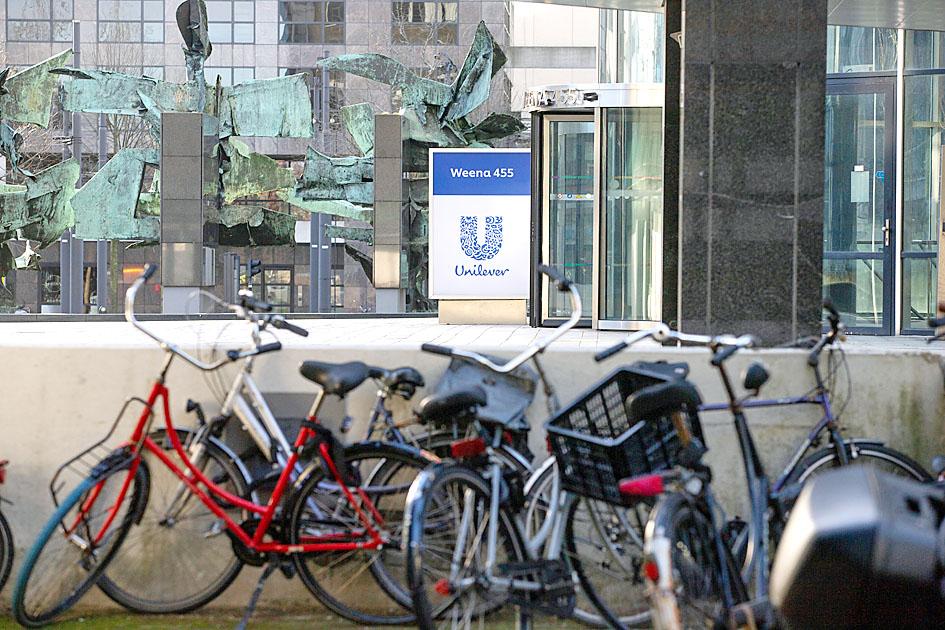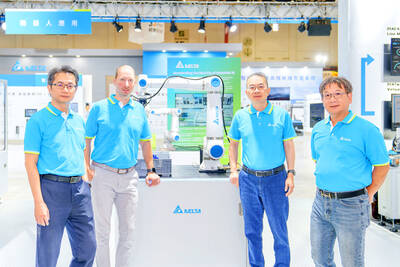Unilever PLC has said that it would take two years to return to the profitability level of last year as the worst inflation since the financial crisis erodes the benefits of faster growth.
Unilever expects peak inflation in the first half of the year, when raw material costs are forecast to increase by 2 billion euros (US$2.3 billion).
Operating margin would likely narrow by as much as 2.4 percentage points this year, Unilever said yesterday, adding that it expects the bulk of the margin to come back next year and a full recovery in 2024.

Photo: Bloomberg
The maker of Dove soap also ruled out making major acquisitions in the foreseeable future after chief executive officer Alan Jope was rebuffed for his attempt to buy GlaxoSmithKline PLC’s consumer healthcare division.
It is Unilever’s first results since news of its unsuccessful attempt to buy the Glaxo unit, which investors met with criticism, provoking a stock sell-off.
Pressure has been rising on Jope after billionaire activist investor Nelson Peltz’s Trian Fund Management LP built a stake in the company.
The company announced a 3 billion euro buyback program as it reported a 4.5 percent gain in underlying sales growth for last year, while analysts expected a gain of 4.3 percent.
Unilever last month said it would cut 1,500 jobs, and restructure its divisions to accelerate growth and improve accountability.
The company is making ice cream, beauty and personal care independent units, which could facilitate mergers and acquisitions.
Unilever in July last year abandoned a forecast for an improvement in its profit margin, saying that it would be near 2020’s level.
The company has been increasing prices by the most in almost a decade to compensate for higher raw material costs.
Unilever’s forecast is for a margin of 16 percent to 17 percent this year.

SETBACK: Apple’s India iPhone push has been disrupted after Foxconn recalled hundreds of Chinese engineers, amid Beijing’s attempts to curb tech transfers Apple Inc assembly partner Hon Hai Precision Industry Co (鴻海精密), also known internationally as Foxconn Technology Group (富士康科技集團), has recalled about 300 Chinese engineers from a factory in India, the latest setback for the iPhone maker’s push to rapidly expand in the country. The extraction of Chinese workers from the factory of Yuzhan Technology (India) Private Ltd, a Hon Hai component unit, in southern Tamil Nadu state, is the second such move in a few months. The company has started flying in Taiwanese engineers to replace staff leaving, people familiar with the matter said, asking not to be named, as the

The prices of gasoline and diesel at domestic fuel stations are to rise NT$0.1 and NT$0.4 per liter this week respectively, after international crude oil prices rose last week, CPC Corp, Taiwan (台灣中油) and Formosa Petrochemical Corp (台塑石化) announced yesterday. Effective today, gasoline prices at CPC and Formosa stations are to rise to NT$27.3, NT$28.8 and NT$30.8 per liter for 92, 95 and 98-octane unleaded gasoline respectively, the companies said in separate statements. The price of premium diesel is to rise to NT$26.2 per liter at CPC stations and NT$26 at Formosa pumps, they said. The announcements came after international crude oil prices

STABLE DEMAND: Delta supplies US clients in the aerospace, defense and machinery segments, and expects second-half sales to be similar to the first half Delta Electronics Inc (台達電) expects its US automation business to remain steady in the second half, with no signs of weakening client demand. With demand from US clients remaining solid, its performance in the second half is expected to be similar to that of the first half, Andy Liu (劉佳容), general manager of the company’s industrial automation business group, said on the sidelines of the Taiwan Automation Intelligence and Robot Show in Taipei on Wednesday. The company earlier reported that revenue from its automation business grew 7 percent year-on-year to NT$27.22 billion (US$889.98 million) in the first half, accounting for 11 percent

A German company is putting used electric vehicle batteries to new use by stacking them into fridge-size units that homes and businesses can use to store their excess solar and wind energy. This week, the company Voltfang — which means “catching volts” — opened its first industrial site in Aachen, Germany, near the Belgian and Dutch borders. With about 100 staff, Voltfang says it is the biggest facility of its kind in Europe in the budding sector of refurbishing lithium-ion batteries. Its CEO David Oudsandji hopes it would help Europe’s biggest economy ween itself off fossil fuels and increasingly rely on climate-friendly renewables. While